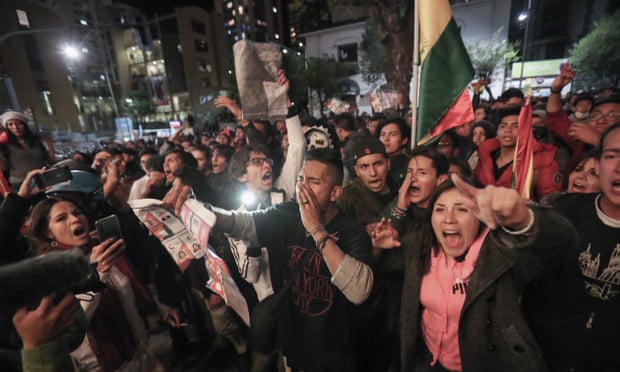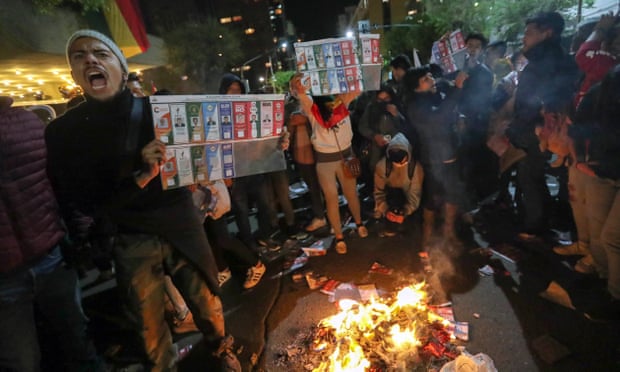- UID
- 20
- Online time
- Hours
- Posts
- Reg time
- 24-8-2017
- Last login
- 1-1-1970
|
|
━━━━━━━━━━━━━━━━━
Protesters set fire to electoral offices in three cities across the country late on Monday amid fury over allegations of vote-rigging

Supporters of the Bolivian opposition candidate Carlos Mesa of Comunidad Ciudadana party prepare to burn ballots during a protest in La Paz, Bolivia, on Monday. Photograph: Martin Alipaz/EPA
▼ Bolivians are bracing for further protests after the country’s electoral authorities said that Evo Morales was close to winning an outright victory in his bid for a historic fourth term as president.
Amid widespread fury over allegations of vote-rigging, violent skirmishes broke out late on Monday, as protesters set fire to electoral offices in three cities across the country.
The country’s electoral body abruptly stopped releasing election returns late on Sunday, prompting opponents to suggest that officials were trying to help Morales avoid a runoff vote.
At that point Morales had a lead of 45.3% to 38.2% over the second-place candidate, former president Carlos Mesa. Late on Monday, the body renewed its count and said that with 95% of votes counted, Morales led 46.41% to Mesa’s 37.06%.
Under Bolivian law, Morales would need a 10-percentage-point advantage over Mesa to avoid a second round in December. The official final count is not due for seven days.
On Tuesday, the EU said the unexpected interruption of the electronic count “sparked serious concerns that need to be fully and swiftly addressed” and called on a thorough investigation.
The Organisation of American States (OAS) also expressed its “deep concern and surprise at the drastic and hard-to-explain change in the trend of the preliminary results revealed after the closing of the polls” and urged for calm.
Opposition groups have not heeded that call. Mesa, who had warned that the vote could be manipulated to avoid a runoff, called on Bolivians “to conduct a battle in defense of the vote”.
Police opened fire with teargas on Monday night as protesters clashed with government supporters outside local offices of the electoral tribunal in the capital La Paz, and the cities of Oruro, Potosí and Cochabamba.

Supporters of the Bolivian opposition candidate Carlos Mesa of Comunidad Ciudadana party burn ballots during a protest in La Paz. Photograph: Martin Alipaz/EPA
In Santa Cruz, opposition figures called for an indefinite country-wide strike while supporters chanted “No tenemos miedo, carajo!” (“We aren’t scared, dammit!”).
Stoking the protesters’ anger were videos shared widely on social media which purportedly showed highly irregular electoral processes, including boxes of ballot papers lying abandoned in a La Paz street and piled high in a warehouse in Potosí.
The interior minister, Carlos Romero, accused the opposition of trying to create trouble, warning that “they have to take care of the violence they’re generating”.
Rodrigo Riaza, a research analyst for Latin America and the Caribbean at the Economist Intelligence Unit, said: “If Morales wins outright in the first round, the opposition will double down on their claims of fraud, which they have built up throughout the campaign.”
The US acting assistant secretary of state for the western emisphere, Michael Kozak, tweeted: “The US rejects the Electoral Tribunal’s attempts to subvert #Bolivia‘s democracy by delaying the vote count & taking actions that undermine the credibility of Bolivia’s elections.”
During Morales’ 13 years in office, Boliviahas largely avoided political unrest, but Monday’s clashes came amid a wave of street violence in neighbouring Chile, and mass protests in Ecuador and Haiti.
“ The region is convulsing. In Bolivia so far there have been tensions but we could go from tension to convulsion if Morales tries to force a victory in the first round,” said the Bolivian political analyst Franklin Pareja.
Being forced into a runoff would be “a sharp blow to Morales, whose political success has been impressive and who seemed confident of a first-round win”, said Michael Shifter, head of the Inter-American Dialogue, a Washington-based thinktank.
“Morales’s failure to achieve a first-round victory reflects growing concern about a slowing economy, corruption scandals and his determination to pursue a fourth term in defiance of a national referendum and the Bolivian constitution. Many Bolivians are simply weary. If re-elected, Evo will be in office nearly two decades.”
Bolivia under Morales has remained a rare example of stability and growth. The economy has grown by an annual average of about 4.5%, well above the regional average, and the International Monetary Fund predicts it will grow at 4% this year.
But Morales has also faced growing dissatisfaction, especially over his refusal to accept a referendum on limiting presidential terms.
► This news was originally published here: Source |
|